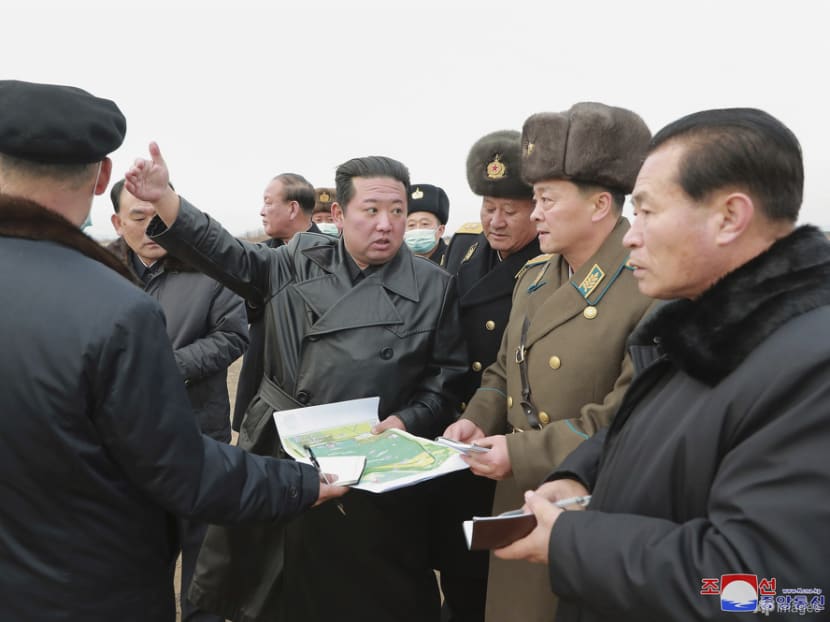Commentary: Where is North Korea getting the resources to test missiles and buy arms?
These arms tests come at the cost of domestic food security and may force South Korea’s hand to launch a pre-emptive strike, says Robert E Kelly.

In this undated photo provided by the North Korean government, its leader Kim Jong Un, center, inspects an area planned for a vegetable greenhouse farm in the Ryonpho area of Hamju county, South Hamgyong province, northeast of Pyongyang, North Korea. (Korean Central News Agency/Korea News Service via AP)
SEOUL: North Korea has pursued an aggressive missile testing schedule this year – seven rounds of launches in less than a month. It has also hinted at the resumption of nuclear weapons tests. All these violate UN sanctions on the country.
Between 2006 and 2017, the UN Security Council passed nine resolutions imposing import and export restrictions on Pyongyang to rein in its weapons of mass destruction programmes.
Each resolution was unanimous, including the votes – not abstentions – of China and Russia. As there are 15 members on the Security Council, nine unanimous resolutions is a powerful statement of international consensus that Pyongyang should stop.
Beginning in 2016, the sanctions moved beyond targeting specific firms and persons associated with North Korea’s weapons of mass destruction, to blockading entire sectors of the North Korean economy. These “sectoral sanctions” have increasingly cut North Korea off from the world economy.
Almost any major transfer of goods in or out of the country is now illegal. Yet the North continues to test missiles and show off its munitions, raising the question where it gets the resources despite the UN blockade.
CHRONIC FOOD SECURITY
North Korea also routinely experiences food insecurity and malnutrition. It has worsened this problem by shutting its border with China for two years to inhibit the spread of COVID-19
Since the mid-1990s, North Korea has routinely solicited the international community for food assistance. The country’s agriculture is notoriously inefficient, and corruption has become widespread as the country has fallen into poverty since the cessation of Soviet assistance in the 1990s.
NGOs and UN agencies working in North Korea routinely put the figure of "food insecure” people around 40 to 50 per cent of the population.
North Korea has tentatively experimented with private agriculture to alleviate these problems, but it fears fully liberalising the economy. That would move significant economic power into hands of private farmers.
Instead, it has looked the other way for years on private gardens and food trade across the border with China. But COVID-19 has disrupted the latter strategy. Most analysts think this is why the North Korean leadership recently has talked about “belt tightening” and “tough times” ahead.
North Korea has sealed itself off from the world economy by insisting on sanctions-inducing weapons tests and cut itself off from its grey market relationships with China now as well. This throws North Korea back on its own resources - insufficient for a socialist economy to meet its needs.
Related:
The last time North Korea stood on its own – unsubsidised by an outside partner or the international community – it suffered a famine, in the late 1990s, which killed approximately 10 per cent of the population.
SO WHERE DOES THE MONEY FOR THE TESTS COME FROM?
Given the country’s dire straits, a normal political elite would redistribute away from defence to agriculture. North Korea already has a massive army, nuclear weapons and a wide range of missiles.
And it spends - we guess, because North Korea provides no data – approximately 25 per cent of its gross domestic product on defence, the highest in the world according to the World Bank.
Some of that money could be put into civilian production, most obviously agriculture, including the use of sparse vehicles and fuel to enhance agricultural output. This has not happened.
This is the unfortunate answer to the source of North Korean resources for all these tests. The country has a long history of diverting resources from civilian production to the military, even when that worsened extreme poverty or even starvation in the general population.
This illustrates why the Kim family regime of Pyongyang is such a difficult international problem. It is willing to starve its own population to fund its sanctioned weapons programmes. Few countries, even dictatorships, have elites this callous.
In the 1990s famine, the regime expanded defence spending even as agricultural yields fell and people literally starved to death in the streets and in their homes. Kim Jong Il, the supreme leader at the time, refused to alter the regime’s contemporaneous military-first policy line, which elevated the defence budget to even greater amounts than during the Cold War.
Kim also refused to take international assistance with any conditions or strings attached. The result was a man-made famine on par with those of Ethiopia in the 1980s and Kampuchea in the 1970s.
The current leader, Kim Jong Un, is on track to do the same. North Korean defence spending remains the highest proportionally in the world, even as sanctions constrict economic growth.
The other source funding its military build-up is smuggling. The Northern elite is long experienced in gangsterism and international criminality. Since the 1970s, it has engaged in illicit overseas activities to raise hard currency.
Since the 1990s, it has used those funds to proliferate and import materials in support of its nuclear programmes.
Among other unsavory activities, it participated in the illegal transfer of nuclear technologies through the clandestine Pakistani AQ Khan proliferation network, purchased telemetric data from Iran, smuggled methamphetamine, counterfeits US dollars and Chinese yuan, and has routinely been caught seeing weapons parts in places like Southeast Asia and Africa.
All of this is illegal of course. But North Korea has gotten good at evasion over decades of practice. UN sanctions are not self-enforcing. There is no global “sanctions police”. UN member states are to do the work themselves, such as port checks on North Korean ships and monitoring domestic banks for North Korea's illicit monies.
Unfortunately, many states, led by China and Russia, make little effort to enforce the sanctions. North Korean money is still sloshing around Chinese and Russian banks, and the US Treasury has struggled for years to identify North Korea front firms and bank accounts.
WHAT DO WE DO ABOUT NORTH KOREA?
The North Korean elite has several advantages over the international community’s effort to discipline it. First, the Kim family is cold-blooded about its own population’s suffering – exchanging their people’s welfare for the regime’s personal security.
In 2011, Egyptian President Hosni Mubarak stepped down rather than send Egypt’s army against Arab Spring protestors in Tahrir Square. Kim Jong Un has no such compunctions.
But there may be limits to how much the North Korean population can withstand widespread malnutrition. Starving people may assume they have nothing to lose by revolting. Recognising this, the regime allowed the China food trade for years for exactly that reason. But that channel has now been foreclosed by China for fear of a COVID-19 outbreak.
Second, the Kims are old hands at getting around rules. It seems unlikely that sanctions can be fully enforced, unless China and Russia weed out violations. This would require great effort. Corrupt businesses are unlikely to risk the lucrative black market relations they have with North Korea.
Rolling back sanctions as a part of a deal with North Korea to cap its nuclear weapons programme would be ideal, but large, path-breaking deals are almost impossible with North Korea. Former President Donald Trump learnt that the hard way.
Despite three unprecedented meeting with Kim Jong Un, the North Koreans made no serious offer to him. They seem determined to hold onto most of their weapons, which forces the rest of the world to respond strategically.
MISSILE DEFENCE OR WORSE
As North Korea increasingly builds up its military capabilities, South Korea – and Japan and the US – will probably increasingly spend on missile defence. This is an arms race and a sub-optimal solution, because the offence has the advantage.
Missile defence, particularly against the delivery of missiles with nuclear payloads, does not work very well, and is very costly. But the North is not going to stop building.
Sanctions should be kept to slow North Korea’s military build-up, but they are not going to stop it or roll it back. A missile shield is the region's next best option.
But since missile defence is not very effective, the South Korean defence debate is now moving toward a pre-emptive strike on North Korea. This already is an issue in the current South Korean presidential campaigns, with the country due to head to polls in March.
It would be hugely risky, but the logic is clear. As North Korea builds more missiles - with short flight times and, possibly, nuclear payloads - its missile capability will increasingly represent an existential, first-strike threat to South Korea.
That in turn encourages South Korea to hit those missiles pre-emptively. This is the terrifying world relentless North Korean weapons-testing is creating.
Dr Robert E Kelly is a professor of international relations in the Department of Political Science at Pusan National University.










